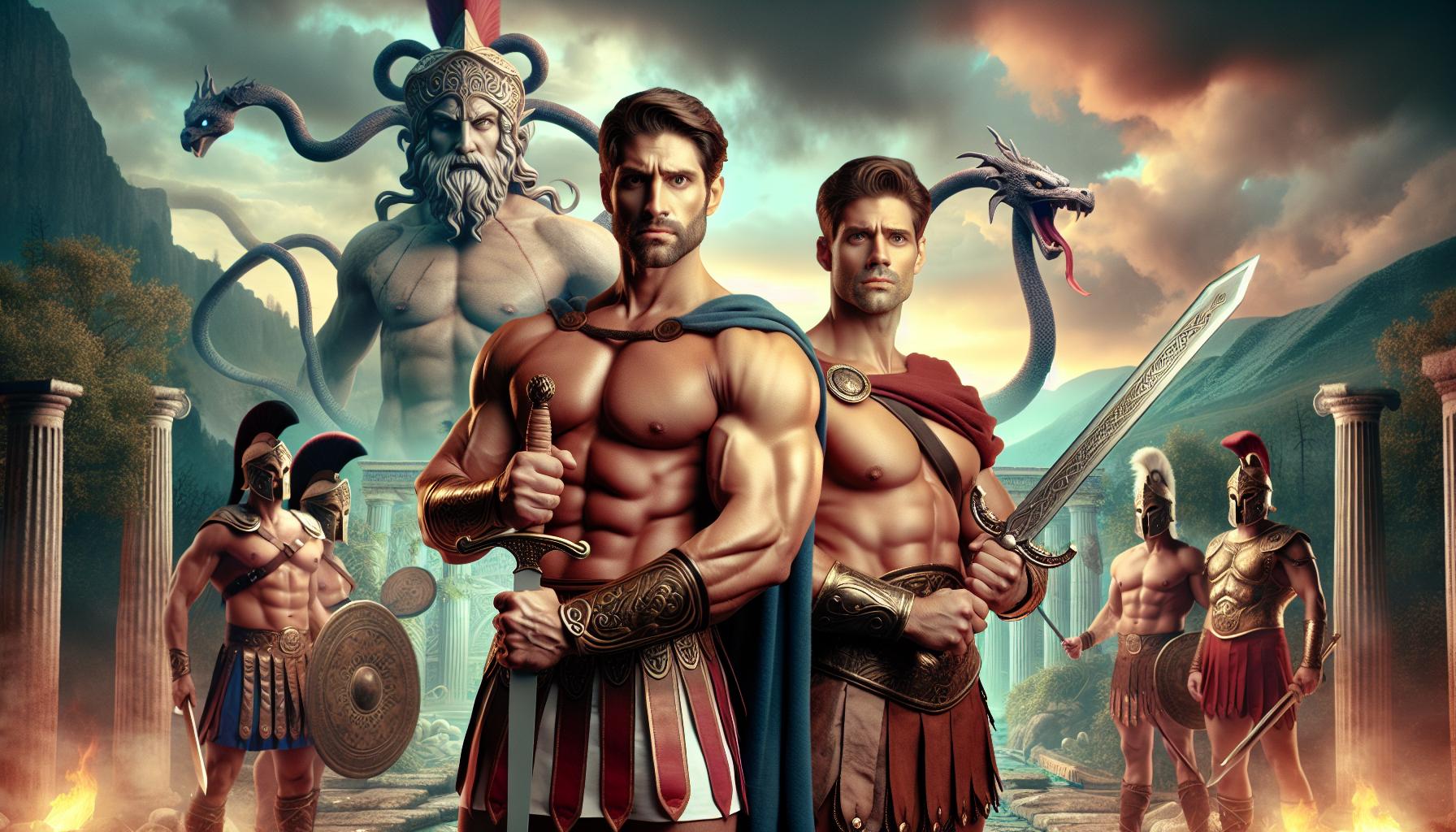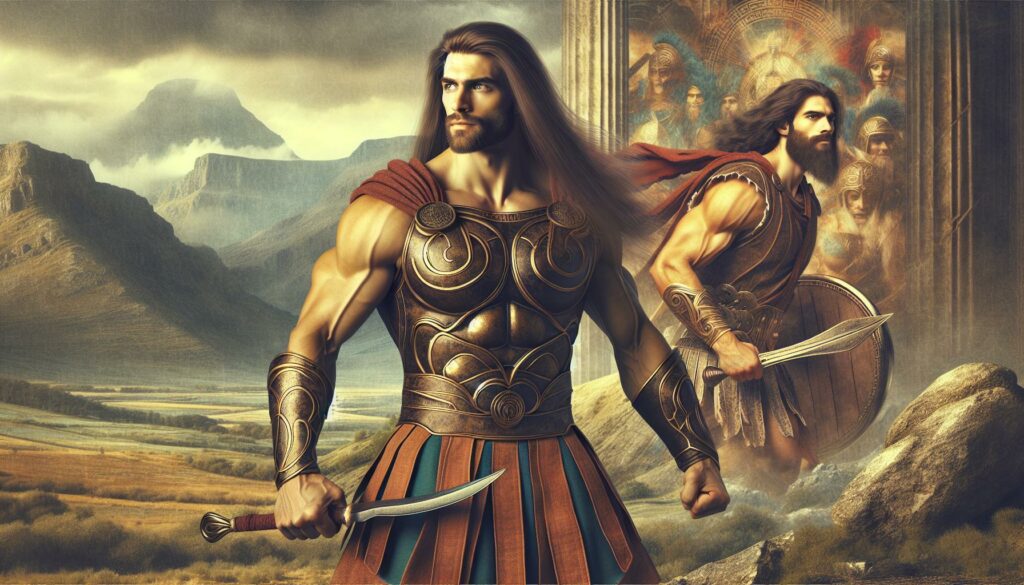As a fan of mythological adventures, I’ve always been captivated by the epic tales of Hercules. But it wasn’t until Hercules: The Legendary Journeys hit our screens that this ancient hero truly came to life for modern audiences.
This groundbreaking TV series, which aired from 1995 to 1999, reimagined the legendary demigod for a new generation. With Kevin Sorbo in the titular role, the show blended Greek mythology, action-packed adventures, and a touch of humor to create a unique viewing experience. It’s no wonder that Hercules: The Legendary Journeys became a cult classic, inspiring spin-offs and igniting a renewed interest in ancient myths.
- Hercules: The Legendary Journeys revolutionized fantasy television by blending Greek mythology with modern storytelling techniques.
- Kevin Sorbo’s portrayal of Hercules, combining physical prowess and charismatic performance, was crucial to the show’s success.
- The series featured innovative visual effects and high production value, setting new standards for television production in the 1990s.
- A talented supporting cast and memorable characters, including Iolaus and various gods, enriched the show’s mythological world.
- The series’ legacy includes influencing future fantasy TV shows and spawning successful spin-offs like “Xena: Warrior Princess.”
- Hercules: The Legendary Journeys expanded into a multimedia franchise, including video games, novels, and merchandise.
Hercules: The Legendary Journeys
Hercules: The Legendary Journeys emerged from a rich tapestry of Greek mythology and modern storytelling techniques. Its origins reflect a unique blend of ancient tales and contemporary entertainment.
Greek Mythology Meets Modern Television
Greek mythology provided the foundation for Hercules: The Legendary Journeys. The show’s creators drew inspiration from the legendary tales of Hercules, adapting them for a 20th-century audience. They reimagined the demigod’s adventures, infusing them with modern sensibilities and humor. This approach made the ancient stories accessible to viewers unfamiliar with Greek mythology, while still preserving the essence of Hercules’ heroic deeds.
The Creative Minds Behind the Series
The series was the brainchild of Christian Williams, who served as the executive producer and developer. Williams collaborated with Sam Raimi and Robert Tapert, known for their work in fantasy and horror genres. Their combined expertise in storytelling and visual effects brought Hercules’ world to life. The team’s creative vision transformed the mythological hero into a relatable character, balancing his superhuman strength with human emotions and struggles. This approach resonated with audiences, contributing to the show’s success and longevity.
Kevin Sorbo as Hercules: A Perfect Casting Choice

Kevin Sorbo’s portrayal of Hercules in Hercules: The Legendary Journeys was a pivotal factor in the show’s success. His physical presence and charismatic performance brought the mythological hero to life, captivating audiences worldwide.
Sorbo’s Physical Transformation for the Role
Kevin Sorbo underwent a rigorous physical transformation to embody the legendary demigod. He gained 30 pounds of muscle through intense weightlifting and adhered to a strict high-protein diet. Sorbo’s dedication resulted in a muscular physique that matched Hercules’ legendary strength, standing at 6’3″ with broad shoulders and defined abs. His long, flowing hair and rugged facial features completed the look, creating an iconic image that became synonymous with the character.
The Actor’s Charismatic Performance
Sorbo’s portrayal of Hercules went beyond mere physical appearance. He infused the character with a unique blend of strength, humor, and vulnerability. Sorbo’s natural charisma shone through in his interactions with other characters, making Hercules relatable and likable. His ability to deliver witty one-liners with perfect timing added a layer of charm to the hero’s persona. Sorbo’s performance balanced the character’s superhuman abilities with human emotions, creating a multidimensional hero that resonated with viewers of all ages.
The Supporting Cast and Memorable Characters

The success of Hercules: The Legendary Journeys wasn’t solely due to Kevin Sorbo’s portrayal of the titular hero. A diverse and talented supporting cast brought depth and excitement to the series, creating a rich tapestry of characters that made Hercules’ world come alive.
Iolaus: Hercules’ Loyal Sidekick
Michael Hurst’s portrayal of Iolaus, Hercules’ steadfast companion, was a cornerstone of the series. Iolaus provided comic relief and emotional support, balancing Hercules’ strength with quick wit and resourcefulness. Their dynamic friendship, filled with banter and mutual respect, became a fan-favorite aspect of the show. Hurst’s performance elevated Iolaus from a mere sidekick to an integral part of Hercules’ adventures, often saving the day with his cleverness and unwavering loyalty.
Recurring Gods and Mythical Creatures
The show’s interpretation of Greek mythology introduced a pantheon of gods and mythical beings that enriched the storylines:
- Zeus: Hercules’ father, portrayed by various actors, appeared sporadically to offer guidance or create conflict.
- Hera: The vindictive queen of the gods, often serving as the series’ primary antagonist.
- Ares: The god of war, played by Kevin Smith, became a recurring nemesis with a complex relationship to Hercules.
- Aphrodite: Alexandra Tydings brought charm and humor as the goddess of love, often meddling in mortal affairs.
- Hydras, Minotaurs, and Cyclopes: These mythical creatures, brought to life through practical effects and early CGI, provided formidable challenges for Hercules and his allies.
The show’s creative team skillfully blended these mythological elements with original characters, creating a unique universe that captivated audiences and brought ancient legends into a modern context.
Innovative Storytelling and Episodic Structure
Hercules: The Legendary Journeys revolutionized TV storytelling by seamlessly blending ancient myths with modern narratives. Its unique episodic structure allowed for both standalone adventures and multi-episode arcs, creating a diverse and engaging viewing experience.
Blending Myth with Contemporary Themes
The show masterfully wove Greek mythology into contemporary themes, making ancient stories relatable to modern audiences. Episodes often tackled issues like social injustice, environmental concerns, and personal growth, using mythological elements as allegories for current challenges. This approach not only educated viewers about classical myths but also provided commentary on present-day society, enhancing the show’s appeal across different age groups and demographics.
Standalone Adventures vs. Multi-Episode Arcs
Hercules: The Legendary Journeys utilized a flexible narrative structure, balancing standalone episodes with multi-episode story arcs. Standalone adventures allowed casual viewers to enjoy self-contained stories without needing extensive background knowledge. These episodes typically featured Hercules solving a problem or defeating a monster within a single installment, making them accessible entry points for new viewers. Multi-episode arcs, on the other hand, developed deeper storylines, character relationships, and overarching themes. These arcs often spanned 2-3 episodes, delving into complex mythological plots or exploring Hercules’ personal journey, rewarding regular viewers with richer, more intricate storytelling.
Visual Effects and Production Value
Hercules: The Legendary Journeys set a new standard for television production with its impressive visual effects and high production value. The show’s commitment to delivering cinematic quality on a TV budget resulted in a visually stunning and immersive experience for viewers.
Groundbreaking CGI for Its Time
The series pioneered the use of CGI in television, pushing the boundaries of what was possible in the mid-1990s. Mythical creatures like the Hydra, Cerberus, and various monsters came to life through a combination of practical effects and computer-generated imagery. The show’s visual effects team, led by Kevin O’Neill, created seamless integrations of CGI elements with live-action footage, enhancing the fantastical elements of Hercules’ world. Despite budget constraints, the team consistently delivered high-quality effects that rivaled those of feature films, setting a new benchmark for television productions.
Iconic Costume and Set Design
The costume and set design in Hercules: The Legendary Journeys played a crucial role in creating the show’s distinctive aesthetic. Costume designer Ngila Dickson crafted iconic outfits that blended historical accuracy with fantasy elements, most notably Hercules’ signature leather vest and gauntlets. The attention to detail extended to supporting characters and extras, ensuring a cohesive visual style throughout the series. Set designers Robert Gillies and Mark Robins created elaborate ancient Greek environments, from rustic villages to opulent temples, using a combination of on-location shooting in New Zealand and meticulously constructed studio sets. Their work contributed significantly to the show’s immersive atmosphere, transporting viewers to a mythical version of ancient Greece.
The Legacy of Hercules: The Legendary Journeys
Hercules: The Legendary Journeys left an indelible mark on television history, shaping the landscape of fantasy and mythological storytelling for years to come. Its impact extends far beyond its six-season run, influencing future productions and spawning a range of spin-offs and related media.
Influence on Future Fantasy Television Series
The success of Hercules: The Legendary Journeys paved the way for a new era of fantasy television. It demonstrated the viability of blending ancient mythology with modern storytelling techniques, inspiring numerous shows that followed. Series like “Xena: Warrior Princess,” “Merlin,” and “Game of Thrones” built upon the foundation laid by Hercules, incorporating elements of historical fantasy and mythological narratives.
The show’s innovative use of CGI and practical effects set a new standard for visual storytelling on television. Subsequent fantasy series adopted similar approaches, pushing the boundaries of what was possible in small-screen productions. “Hercules” proved that high-quality visual effects could be achieved on a television budget, encouraging networks to invest in more ambitious fantasy projects.
“Hercules” also popularized the concept of the “modern hero in a historical setting,” a trope that has been replicated in various forms across different TV series. This approach of making ancient characters relatable to contemporary audiences has become a staple in fantasy television, seen in shows like “Outlander” and “Vikings.”
Spin-offs and Related Media
The success of Hercules: The Legendary Journeys led to a variety of spin-offs and related media, expanding the franchise’s reach:
- “Xena: Warrior Princess”: The most successful spin-off, featuring Lucy Lawless as the titular character. It ran for six seasons, matching the longevity of its parent show.
- “Young Hercules”: A prequel series starring Ryan Gosling as a teenage Hercules, exploring the hero’s formative years.
- Animated series: “Hercules and Xena – The Animated Movie: The Battle for Mount Olympus” brought the characters to life in animated form.
- Video games: Multiple games were released across various platforms, including Hercules: The Legendary Journeys for Nintendo 64 and PlayStation.
- Novels and comics: The franchise expanded into print media, with numerous novels and comic book series exploring new adventures of Hercules and related characters.
- Merchandise: Action figures, collectibles, and other merchandise allowed fans to engage with the franchise beyond the screen.
The extensive range of spin-offs and related media demonstrates the enduring popularity of the “Hercules” franchise and its ability to captivate audiences across different mediums. This multimedia approach has since become a common strategy for successful television properties, with many shows now aiming to create expansive universes that extend beyond their original format.
Mythology of Hercules Journey
Hercules: The Legendary Journeys stands as a landmark in television history. It’s blend of mythology action and humor captivated audiences worldwide and left an indelible mark on pop culture.
The show’s innovative storytelling groundbreaking visual effects and memorable characters continue to inspire creators today. Kevin Sorbo’s iconic portrayal of Hercules remains etched in the minds of fans.
As I reflect on the series’ impact I’m reminded of its enduring legacy. Hercules not only entertained but also educated sparking interest in ancient myths and paving the way for future fantasy epics on television.


